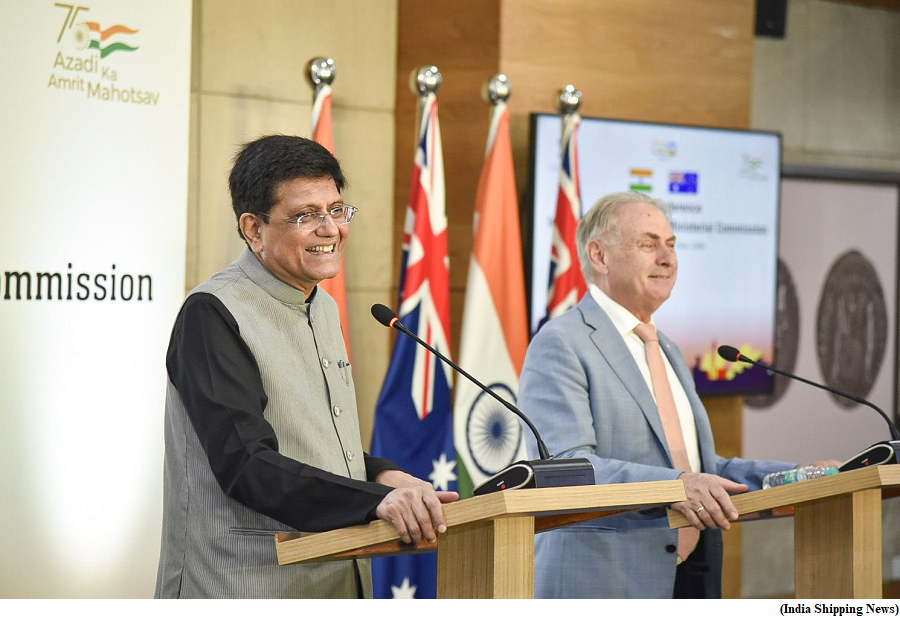Joint Statement of 18th India-Australia Joint Ministerial Commission (JMC) (GS Paper 2, International Relation)

Why in news?
- Recently, India’s Minister of Commerce and Industry, and Australia’s Minister for Trade and Tourism, discussed next steps for further enhancing the bilateral economic relationship.
Details:
- They discussed implementation of the Economic Cooperation and Trade Agreement (ECTA), negotiations for the India-Australia Comprehensive Economic Cooperation Agreement (CECA) and further developing two-way investment.
- They also discussed engagement in the G20, the Indo-Pacific Economic Framework (IPEF) and the World Trade Organization (WTO).
CECA:
- The Prime Minister of both countries look forward to swift progress in negotiations and for an early conclusion of an ambitious Comprehensive Economic Cooperation Agreement (CECA), which will build on the foundation laid by the ECTA, including new areas of trade, investment and cooperation.
- CECA will create new employment opportunities, raise living standards and improve the general welfare in both countries. They look forward to concluding CECA as soon as possible, are pleased with the progress resolving various bilateral technical market access issues and look forward to continuing engagement.
Clean Energy & SDGs:
- They highlighted the importance of a smooth and timely clean energy transition as both countries work towards achieving their respective net zero goals.
- Australia reiterated its strong support for India’s G20 Presidency. They agreed that the G20 needs to help the world navigate a pathway back to strong, sustainable and inclusive growth, including accelerating progress to achieve the Sustainable Development Goals.
Multilaterals:
- Australia and India share high ambition for the IPEF, as evidenced at the special round of IPEF negotiations in New Delhi, and would continue to work together though IPEF on areas of mutual interest, including the clean economy and resilient supply chains.
- They reaffirmed the importance of the multilateral trading system, with the WTO at its core. They agreed to build on the success of the 12th WTO Ministerial Conference in Geneva and reaffirmed their commitment towards improving WTO functions and having a fully functioning dispute settlement system by 2024.
- They agreed to work towards a productive engagement in the run up to the 13th WTO Ministerial Conference to be held in Abu Dhabi in 2024.
Bilateral trade:
- They acknowledged that Australia and India are important trading partners. India-Australia bilateral trade exceeded US$31 billion last financial year.
- Both agreed that given the trade complementarities between the two countries, there is considerable potential for significantly enhancing bilateral trade within the next 5 years.
Rajasthan’s Right to Health Bill
(GS Paper 2, Health)
Why in news?
- The recently concluded Budget session of the Rajasthan Assembly revived the debate around the Right to Health Bill.
- The legislation, if passed, will provide mandatory free and affordable medical services in hospitals, clinics and laboratories; both public and privately owned.
- Private hospital doctors object to the Bill citing it is hastily drafted, ignores ground realities and may tighten norms in an already over-regulated field.

What does the Bill say?
- The Congress-led government tabled the Right to Healthcare Bill, 2022 in the Rajasthan State Assembly in September 2022.
- The Bill provides rights to patients and healthcare providers, places the obligation on the government to protect these legal rights and mandates the setting up of grievance redressal mechanisms.
- Rajasthan residents will be entitled to free check-ups, drugs, diagnostics, emergency transport and care at all public health institutes, along with affordable surgeries.
- The Bill frames medical services as a public service rather than a vehicle for making money. If enacted, the Act will have a recurring annual expenditure of ₹14.5 crore.
Clauses:
- Clause 3 of the Bill lays down 20 rights a State resident will be entitled to, including the right to informed consent, to seek information (in the form of medical records and documents) regarding diagnosis and treatment, and to receive treatment without discrimination based on caste, class, age, gender, etc.
- Clause 4 of the Bill shifts the burden of responsibility in providing adequate medical services to the government. The government is “obligated” to provide funds, set up institutions and constitute grievance redressal systems.
- Clause 4 mandates that the government develop a Human Resource Policy for health ensuring equitable distribution of doctors, nurses and healthcare workers at all levels of the system across regions.
Does the Constitution guarantee a right to health?
- The Indian Constitution does not explicitly talk about a right to health. A “right to health”, in theory, is derived from the right to life and liberty as guaranteed under Article 21 of the Constitution.
- Previously, courts have highlighted the State’s obligation to protect and promote the health of citizens, pointing to Constitutional provisions such as Article 38 (promoting the welfare of people) and Article 47 (which directs the government to meet the nutrition and health requirements of the population).
Why are people opposed to it?
- The staunchest resistance to the Bill has come from private healthcare providers, owing to the ambiguity around who will pay for the mandatory free-of-cost emergency treatment.
- After protests, the government has agreed to create a fund to reimburse any emergency care offered by the private sector.
- Further, doctors argue the Bill is both futile and an exercise in over-regulation. Clinics and hospitals are required to abide by State regulations and norms.



